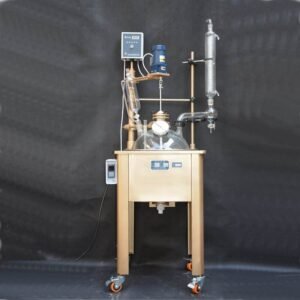In laboratory research, effective solvent removal is essential. The Mini Rotary Evaporator for Laboratory Research by Equilrxnlab offers a compact, highly efficient solution for evaporation processes in fields ranging from chemical synthesis to pharmaceutical analysis. This article explores how the mini rotary evaporator supports lab workflows with its precise design, efficiency, and ease of use.
Understanding the Mini Rotary Evaporator
A mini rotary evaporator is a lab instrument that simplifies the process of solvent evaporation through rotation, vacuum, and controlled heating. It’s especially beneficial in labs with limited space or when handling small-scale samples. While compact, the Mini Rotary Evaporator for Laboratory Research matches the performance of larger systems in consistency and precision.
Explore full specifications here: Product Page
Key Features of the Mini Rotary Evaporator
Equilrxnlab’s model includes these standout features:
- Rotary Flask Capacity: 3L — suitable for mid-sized solvent volumes.
- Collection Flask: 2L — allows efficient recovery of evaporated solvent.
- Rotational Speed: 0–120 rpm — provides flexibility depending on viscosity and solvent properties.
- Temperature Range: 0–99°C (customizable) — supports diverse solvents and compounds.
- Temperature Accuracy: ±1°C — ensures repeatability and control.
- Power Supply: 220V/50Hz (customizable) — adaptable to lab needs.
Each of these features helps deliver accurate, controlled evaporation while minimizing solvent loss.
Applications in Scientific Fields
1. Chemical Synthesis
After reactions, solvents must be removed without degrading compounds. The mini rotary evaporator offers quick, low-temperature solvent removal, making it ideal for handling delicate materials.
2. Pharmaceutical Research
It plays a critical role in processing active pharmaceutical ingredients (APIs). Temperature accuracy ensures compounds remain stable and intact during the process.
3. Environmental Testing
This device is ideal for concentrating water, soil, and air samples during environmental monitoring. Its compact footprint allows placement in mobile or shared lab settings.
4. Food and Beverage Analysis
Flavor and fragrance extraction is common in food science. Gentle solvent evaporation via the mini rotary evaporator preserves delicate volatile compounds.
5. Nanotechnology and Materials Science
In nanomaterials research, preserving structure during solvent removal is vital. This evaporator supports precise temperature control and minimal disturbance to sensitive particles.
Why Choose the Mini Rotary Evaporator from Equilrxnlab?
✅ Compact Yet Powerful
Designed for labs with space constraints, it delivers high performance without compromising on functionality.
✅ Optimized for Solvent Recovery
Its condenser area and controlled vacuum system maximize solvent recovery rates, cutting down waste and cost.
✅ User-Friendly Design
Whether you’re a seasoned researcher or new to the process, the intuitive controls and robust design ensure a smooth user experience.
✅ Built for Precision
Its ±1°C accuracy in temperature control and customizable rotation speed enable tailored processing of different solvents.
Learn more about our evaporation tools in our Product Catalog
Operating Instructions
To ensure optimal use:
- Setup: Assemble the rotary and collection flasks, connect to vacuum and condenser.
- Sample Load: Fill no more than 50–60% of the flask to allow efficient evaporation.
- Configure Settings: Adjust the temperature and speed as per your compound’s boiling point.
- Evaporation: Initiate rotation and apply vacuum. Monitor solvent collection.
- Collection: Once evaporation completes, collect the solvent from the collection flask.
- Maintenance: Clean the system post-operation to avoid contamination.
Need help? Contact Us
Reinforcing Research with Equilrxnlab
Equilrxnlab not only provides high-quality lab instruments like the Mini Rotary Evaporator, but also ensures global support, customization, and training options for every laboratory need. Whether your work involves drug formulation, academic research, or material analysis, this tool is engineered to streamline your evaporation tasks.
Check out our social media to see real-life lab setups and customer feedback:




